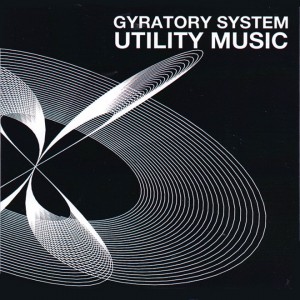The records of Gyratory System are a perfect soundtrack for your contemporary urban flaneur. Walking around any large city with their new album playing in your ears, their hypermobile instrumentals blend perfectly with the street sounds inevitably assailing you from all sides. Led by acclaimed experimental jazz trumpeter Andrew Blick, the collective create pieces that seem to invite random collaboration, and the influx of voices, rumbles, sirens, shrieks and parps from outside seem a natural fit with any track, and ensure too that each one is different on every listen. Eat that, Eno!
Utility Music is genuinely useful, and it’s also art. It continues Gyratory System’s trademark Steve Reich meets 23 Skidoo, Holy Fuck with a brand new Pigbag groove, but the furrows have deepened and developed strange new contours along the way.
I must admit here that while I was cock-a-hoop for the frenzied noise-pop of Gyratory System’s 2009 debut, The Soundboard Breathes, I must have been in the bath or on the moon when its follow-up, 2011’s New Harmony was released. So I’ve obviously missed a stage in the band’s development, but one thing that strikes me about Utility Music is that it’s a less abrasive and more accessible record than The Soundboard Breathes. It’s also far less jazz-influenced, with Andrew Blick’s trumpet often either replaced by layers of synthesisers or so treated as to be unrecognisable as a traditional brass instrument.
That’s not to say that Utility Music doesn’t still swing, because it surely does; ‘Harmonograph’ sounds just like the pendulum-based drawing machine it’s named after, oscillating melodically and sometimes queasily back and forth in ever-increasing arcs, leaving layered and intricate patterns in its wake. And ‘Thorney Island’ even features a snaking saxophone, cutting up amongst the perky beats and stabbing keyboards like a suave, zoot-suited hepcat moving smoothly through the gurning rave casualties of a later era. But ‘AAA’ weaves subtle Arabic influences through its rain-drenched urban landscapes, while ‘Mr Portsmouth’ is an atypical highlight, with distorted, decaying bass drones suggesting a church organ playing at the bottom of a harbour basin, the notes rising eerily up through the deep murky waters.
‘Lackland’ is a meditative if unsettling oasis of beat-less calm before ‘Old Harmony’ recapitulates the urgent madness of The Soundboard Breathes as well as nodding towards the Ghost Box stable as it flashes with the fury of late-1970s schools-TV themes gone feral; squelching analog synths dancing madly up and down the scales like leotard-clad kids trapped in a movement and drama class while high on panda pops and shonky bootleg sherbet.
Drawing from a similar well of krautrock and psychedelic electronica as the still-underrated Eat Lights Become Lights, Gyratory System always have a distinctive playful streak, an old-fashioned London cheekiness that’s hard to capture in complex instrumental music such as this, but which consistently comes over nevertheless. From the opening, stiff-legged scarecrow dance of ‘John Frum’ (named for the fascinating god-figurehead of the cargo cults on the South Pacific island of Tanna), to ‘The Spectrum,’ which sees the return of their trademark traffic-jam-as-orchestra massed honking horns, Gyratory System are always on the make, ducking and diving like a Soho pickpocket. This track in particular shows their mastery of the seemingly endless build, twisting and contorting as it ascends towards a plateau that never quite arrives, and making hip young bucks Public Service Broadcasting sound like one-concept lightweights in comparison. They may seem like they’re just going round in convoluted circles, but Gyratory System are taking you much further out than you’d ever bargained for.


